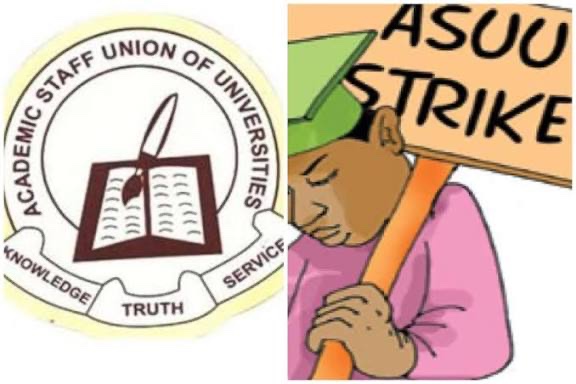
The Academic Staff Union of Universities (ASUU) has announced that it will commence a two-week warning strike on Monday, October 13, 2025, following the expiration of a two-week ultimatum issued to the Federal Government to address its longstanding demands. The union’s decision marks a return to industrial action after several months of failed negotiations with the government. The ultimatum, which ended on Sunday night, was reportedly ignored by the Federal Government, which has not issued any formal response or made any visible moves to prevent the impending strike.
ASUU had, two weeks ago, issued a stern warning to the Federal Government, demanding the full implementation of agreements reached in previous negotiations. The union specifically called for urgent action on issues such as funding for public universities, payment of withheld salaries, the adoption of the University Transparency and Accountability Solution (UTAS), and the review of lecturers’ remuneration and welfare packages. The ultimatum, which elapsed at midnight on Sunday, October 12, 2025, was intended to give the government sufficient time to engage meaningfully with the union and avert industrial unrest. However, as of Sunday evening, there was no indication that the Federal Ministry of Education or the Ministry of Labour had taken concrete steps to address the concerns.
ASUU officials confirmed that the strike would go ahead as planned, describing the government’s silence as “irresponsible and provocative.”
Reliable sources within the union disclosed that ASUU’s National Executive Council (NEC) held a virtual meeting late Sunday to finalize preparations for the warning strike. During the meeting, the leadership reviewed reports from various university branches, which indicated readiness to comply with the national directive. “Branches have been directed to commence full implementation of the warning strike beginning from Monday,” a senior ASUU member at the University of Ibadan told reporters. “This is not a decision we take lightly, but the Federal Government’s continuous neglect of our agreements has left us with no choice.”
Across several campuses, notices have already been circulated informing students and academic communities of the planned industrial action. Many universities are expected to suspend academic activities, examinations, and departmental meetings for the two-week duration.
The current face-off between ASUU and the government is rooted in unresolved issues that have persisted for years. The major grievances include the renegotiation of the 2009 ASUU-FGN Agreement, payment of withheld salaries and earned academic allowances, the adoption of the University Transparency and Accountability Solution (UTAS), revitalization funds for public universities, and the proliferation of underfunded universities. ASUU insists that these issues have lingered for too long without genuine commitment from the authorities.
In a statement issued on Sunday evening, ASUU National President, Prof. Emmanuel Osodeke, criticized the government’s lack of commitment, describing it as a deliberate attempt to undermine the education sector. “We have been patient, we have engaged, and we have negotiated in good faith,” Osodeke said. “But the Federal Government has chosen to ignore our legitimate demands. We are left with no option but to embark on this two-week warning strike to compel action.”
Osodeke emphasized that the strike was not politically motivated but a necessary step to defend the integrity of Nigeria’s public university system. “If the government fails to act within these two weeks, the union will convene to decide on a full-blown, indefinite strike,” he warned.
News of the impending strike has sparked anxiety among students and parents across the country. Many students, especially final-year and postgraduate candidates, fear that their academic calendars could once again be disrupted. A student at the University of Lagos, Oluwaseun Adetola, lamented, “We just resumed after months of uncertainty. Now another strike is coming. It’s frustrating because it affects our progress and mental stability.” Parents and education advocates have also appealed to both sides to find common ground. The National Parent-Teacher Association of Nigeria (NAPTAN) called on President Bola Tinubu to personally intervene to prevent further disruption of academic activities.
As of press time, neither the Federal Ministry of Education nor the Ministry of Labour and Employment had issued an official statement regarding ASUU’s planned action. The government’s silence has drawn criticism from civil society organizations, who argue that it reflects a lack of urgency in addressing critical national issues. A policy analyst, Dr. Akin Oloyede, said the government’s approach to labor disputes has often been reactive rather than preventive. “The government should learn to engage unions proactively before matters escalate into strikes,” he said. “ASUU’s demands are not new; they are issues that can be addressed through consistent dialogue.”
Education experts warn that even a two-week strike could have significant implications for the country’s higher education system. Ongoing research projects, examinations, and academic conferences are likely to be postponed. The strike may also strain relations between university managements and their host communities, as campus operations slow down. Economically, the disruption could extend beyond universities, affecting small businesses and service providers that rely on student and staff patronage.
With the warning strike set to begin on Monday, all eyes are now on the Federal Government. If no meaningful engagement occurs during the two-week period, ASUU may escalate the industrial action into an indefinite strike—a move that could once again paralyze Nigeria’s public university system. Education observers note that the coming days will be critical in determining whether both parties can return to the negotiation table or whether the standoff will deepen. As the clock ticks toward Monday morning, the nation’s academic community remains on edge, uncertain about what lies ahead.

